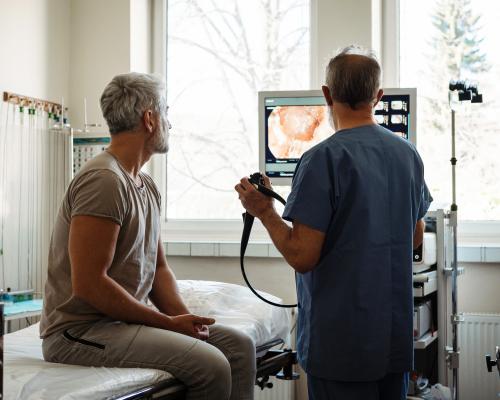
Colorectal cancer is the third-most diagnosed cancer and third leading cause of cancer deaths in the US, according to the Cancer Research Institute. It is also the third-most common cancer in the UK, and accounted for 12.6% of new cancer cases in the country in 2021.
Rates of the disease have dropped overall in recent decades, but in those under 50, rates have increased significantly.
“Individuals born in the 1980s are about twice as likely to get colorectal cancer as those born in the 1960s, and individuals born in the 1990s are about three times as likely,” says Dr Zachariah Foda, assistant professor of medicine and oncology at the Johns Hopkins University School of Medicine.
Experts don’t know the reasons behind this increase, but medical guidelines have shifted to address it. In 2021, the recommended age to start colorectal cancer screening in the US – either by colonoscopy or at-home testing – was lowered from 50 to 45. In the UK, screening is currently offered starting at age 52, and will soon be offered to those aged 50.
Colorectal cancer is preventable and “highly treatable” if detected early, according to the National Cancer Institute. But fewer than 20% of those aged 45 to 49 are keeping up with screenings, compared with 72% of those aged 50 to 75. Experts say some people don’t know they should be getting screened, and others are nervous about what colonoscopies entail.
Here’s what you need to know about colonoscopies and colorectal cancer screening.
What is a colonoscopy?
“A colonoscopy is an endoscopic procedure, meaning we use a camera at the end of a long tube to examine the colon and rectum,” explains Foda. The colon itself is about 70cm long, he says.
Patients are first put under sedation or anesthesia. Doctors then insert the scope into their rectum, and examine the lining of the colon for any abnormalities, like masses or small bumps called polyps. These polyps are usually removed during the procedure.
“The closest analogy is, you have a mole on your skin and it’s growing or discolored, and doctors remove it,” says Michael Sapienza, CEO of the Colorectal Cancer Alliance, a colorectal cancer advocacy group in the US.
If a mass is too big to remove during the colonoscopy, the doctor will take a sample to biopsy and test for cancer.
A colonoscopy is an outpatient procedure, meaning you can go home the same day. The procedure itself usually takes about 20 to 30 minutes, but with pre- and post-procedure care, the whole process can last two to three hours, says Dr Andres Carrion, a gastroenterologist at GastroMed Miami.
One of the most common concerns about colonoscopies is that they are painful, says Carrion. But “intravenous sedatives make the procedure easy, and there is no pain or discomfort”, he explains.
How do you prepare for a colonoscopy?
Colonoscopy preparation starts about a week before the procedure. Patients are instructed to eat a “low residue” diet for that week, which means avoiding foods that can make it difficult for doctors to get a good look at the lining of the colon.
“These are things that the body takes a while to get rid of, like seeds, nuts, leafy greens and high fiber things,” says Foda.
The day before the procedure, patients are restricted to a clear liquid diet – no solid foods. And the night before, they take laxatives to fully clear the colon. This can result in spending quite a bit of time on the toilet.
“Hopefully you have some good reading or a movie you can watch on your phone,” says Sapienza.
What are the risks of a colonoscopy?
Colonoscopies are generally extremely safe, but as with any medical procedure, there are risks.
According to the Cleveland Clinic, these include an adverse reaction to the sedative or anaesthetic used, dehydration from the preparation process, slight bleeding after a polyp is removed or mass biopsied, some abdominal pain, infection and a perforated bowel.
This last risk is serious, but rare. One review found that there were four bowel perforations for every 10,000 colonoscopies performed.
At what age should you get screened for colorectal cancer?
Those at an average risk of colorectal cancer – meaning no family history of the disease and no prior history of colon polyps – should get regular screenings from ages 45 to 75, says Carrion.
Above the age of 75, screening needs are determined on a case-by-case basis. Depending on a person’s health and medical history, doctors may decide that colonoscopies could do more harm than good.
For those with a first-degree family member – meaning a parent, sibling or child – diagnosed with colorectal cancer, Carrion says screening should start 10 years before the age at which your relative was diagnosed. For example, if your mother was diagnosed with colon cancer when she was 45, you should start getting screened at 35.
Certain medical histories also put individuals at a higher risk for colorectal cancer, says Foda. This includes those who have previously had cancer and have received chemotherapy, those with inflammatory bowel disease, as well as those with Lynch syndrome (a condition that increases an individual’s risk for many kinds of cancer) and polyposis (a condition characterized by a large number of polyps in the colon).
Are there other methods of colorectal cancer screening?
Colonoscopies are not the only way to screen for colorectal cancer. For those at an average risk of the disease, there are also non-invasive at-home tests like Cologuard and the fecal immunochemical test (FIT), says Sapienza.
For both tests, a patient will receive the necessary testing material in the mail or from a doctor. They will then have to mail in a personal fecal sample. The FIT analyzes whether there is blood in the stool. The Cologuard test looks for both blood in the stool and abnormal DNA that could point to polyps or masses in the colon.
How often should you be screened for colorectal cancer?
The frequency for each person depends on a number of factors including the type of test performed and medical history.
If a colonoscopy is completely clear, you can usually wait 10 years before your next procedure, says Sapienza, but check with your doctor.
Current guidance recommends that FIT tests be repeated every year, and Cologuard every three years, says Sapienza. If the test is negative, no further analysis is required. If either test comes back positive, you will have to have a colonoscopy. This does not mean the at-home tests are not effective at detecting the disease alone, says Foda. “They should be viewed as part of the gold standard for colorectal cancer screening.”
What are the symptoms of colorectal cancer?
In addition to regular screenings, be familiar with possible symptoms of colorectal cancer, says Sapienza. This is especially important for those under 45, who might not be eligible yet for screenings.
These symptoms include blood in the stool, especially dark blood; a change in bowel habits; anemia; involuntary weight loss; and/or ongoing stomach discomfort.
If you start to present with any of these symptoms, talk to your primary care doctor or gastroenterologist, and ask for a colonoscopy, he says.
“We need to make sure that people are aware of these symptoms,” says Sapienza. “This is a disease where screening saves lives.”





